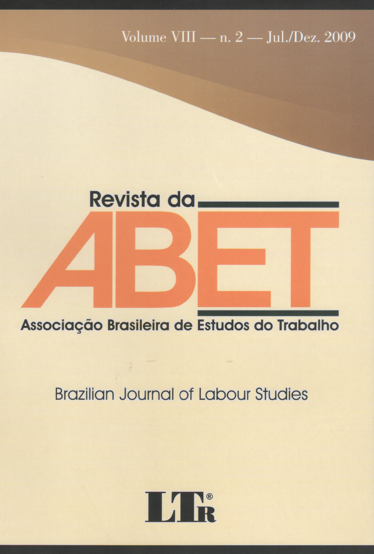Sao Paulo’s Metalworker’s Performance: Demands and Political Conservatism
Abstract
The Union of Metalworkers of Sao Paulo, since its origin, has behaved in a peculiar way, which was not fully noticed by some analysts of the Brazilian unionism. From 1951 to 1964 the Union was under the influence of PCB and has worked to improve the fight for wages. However, apart from that 1951-1964 period, since than 1932, the SMSP (Union of Metalworkers of Sao Paulo) has taken a conservative political orientation: it has resisted the advances of the progressive struggles in the populist period; and supported the dictatorial and neoliberal governments. SMSP exists for nearly 70 years, in which most of the time its conservative trend in the political arena became obvious. Whilst in the demands field, SMSP´s actions from 1932 until the military coup of 1964 varied from inexistent to moderate. During the military dictatorship the strike actions were restricted to the opposition to the metallurgical union, focused on the Movement of Opposition to the Metalworkers of Sao Paulo (MOMSP). Since the late 1980s, the SMSP has taken actions supporting the workers´ strikes and demands, while in a political level it represents a major support class for the neoliberal governments in Brazil. The article comprises three sections. The first one is an analysis of the São Paulo Metalworkers’ Trade Union development up to the 1980s with a sub-section which is about the strike movement requests of the pragmatic trade union movement. The second section is a study of this trade union fight for its rights during the 1990s. And finally the conclusion.Downloads
Downloads
Published
How to Cite
Issue
Section
License
Política de Acesso Livre
Esta revista oferece acesso livre imediato ao seu conteúdo, seguindo o princípio de que disponibilizar gratuitamente o conhecimento científico ao público proporciona maior democratização mundial do conhecimento.
Atribuição dos artigos é não comercial (sem derivações 4.0, isto é, Creative Commons) e o acesso é livre e gratuito para download e leitura.
Não há taxa para submissão, avaliação e publicação de artigos.
Copyright
1) Os artigos são de responsabilidade exclusiva dos autores. É permitida sua reprodução, total ou parcial desde que seja citada a fonte.
2) Os trabalhos enviados para publicação devem ser inéditos, não sendo permitida sua apresentação simultânea em outro periódico nacional.
3) Os artigos são submetidos a pareceristas "ad hoc", após prévia avaliação da Comissão Editorial, os quais podem aceitar, recusar ou reapresentar o original ao autor com sugestões para alterações. Os nomes dos pareceristas permanecem em sigilo, bem como os nomes dos autores.
Os Autores que publicam nesta revista concordam com os seguintes termos:
Autores mantêm os direitos autorais e concedem à revista o direito de primeira publicação, com o trabalho simultaneamente licenciado sob a Creative Commons Attribution License, permitindo o compartilhamento do trabalho com reconhecimento da autoria do trabalho e publicação inicial nesta revista.
Autores têm autorização para assumir contratos adicionais separadamente, para distribuição não-exclusiva da versão do trabalho publicada nesta revista (ex.: publicar em repositório institucional ou como capítulo de livro), com reconhecimento de autoria e publicação inicial nesta revista.
Autores têm permissão e são estimulados a publicar e distribuir seu trabalho online (ex.: em repositórios institucionais ou na sua página pessoal), já que isso pode gerar alterações produtivas, bem como aumentar o impacto e a citação do trabalho publicado.
Patrocinador
A publicação recebe financiamento da Associação Brasileira de Estudos do Trabalho.










